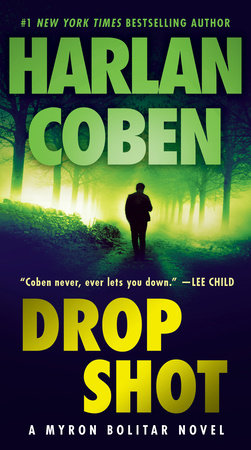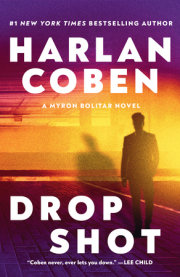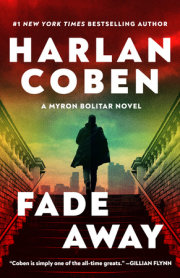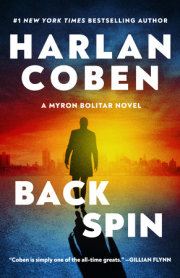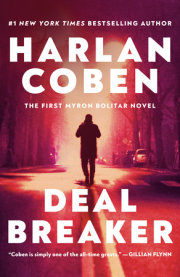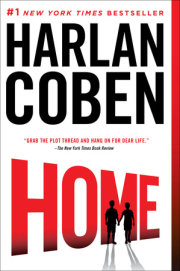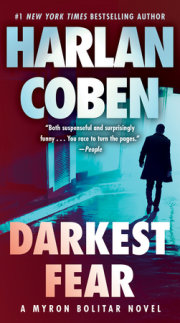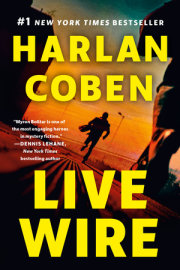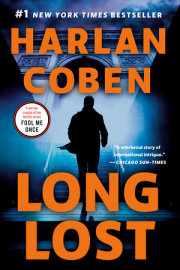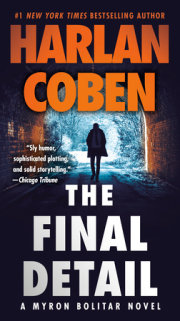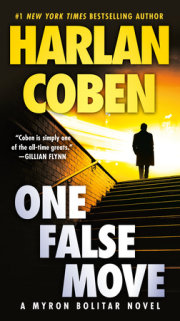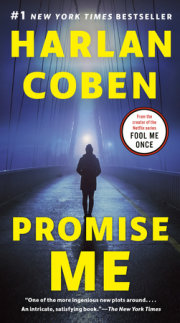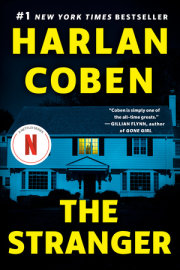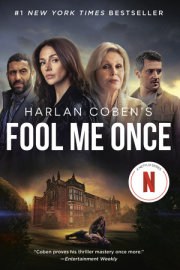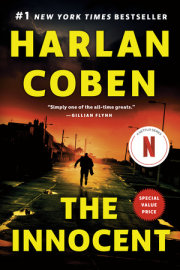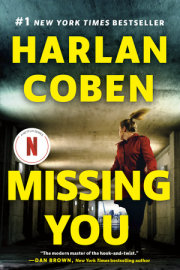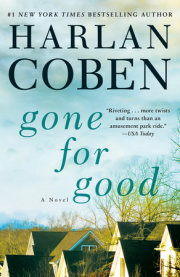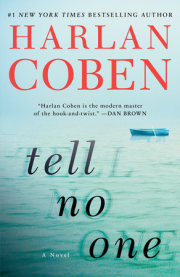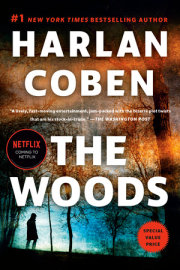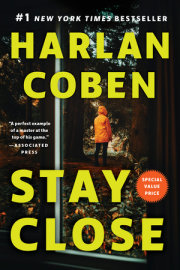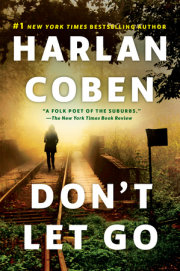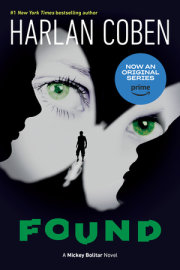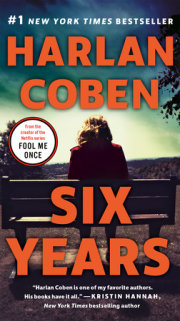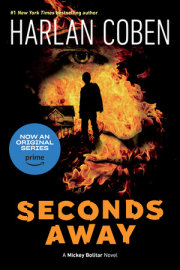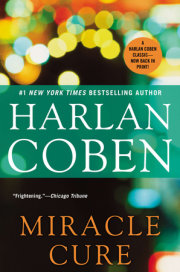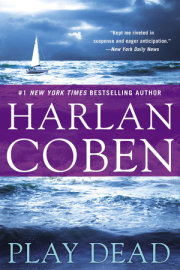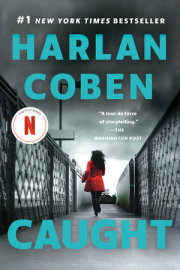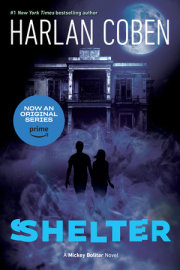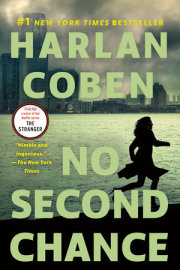Chapter One
Cesar Romero," Myron said.
Win looked at him. "You'renot serious."
"I'm starting off with aneasy one."
On Stadium Court the players were changing sides. Myron's client,Duane Richwood, was shellacking the number-fifteen seed IvanSomething-okov, leading 5-0 in the third set after winning the firsttwo sets 6-0, 6-2. An impressive U.S. Open debut for the unseededtwenty-one-year-old upstart from the streets (literally) of New York.
"Cesar Romero," Myron repeated. "Unless you don't know."
Win sighed. "The Joker."
"Frank Gorshin."
"The Riddler." Ninety-second commercial break. Myron and Win were keeping themselves busy with a scintillating game of Name the Batman Criminal. The TV Batman. The Batman starring Adam West and Burt Ward and all those Pow, Bam, Slam balloons. The real Batman.
"Who played the second one?" Myron asked.
"The second Riddler?" Myron nodded.
From across the court Duane Richwood flashed them a cocky smile. He sported garish aviator sunglasses with loud fluorescent green frames. The latest style from Ray*Ban. Duane was never without them. He had become not only identified by the shades but defined by them. Ray*Ban was rather pleased.
Myron and Win sat in one of the two players' boxes reserved forcelebrities and players' entourages. For most matches every seat inthe box was filled. When Agassi played the night before, the box had over flowed with his family, friends, suck-ups, young lasses, environmentally correct movie stars, hair weaves-like an Aerosmith backstage party. But Duane had only three people in the box: agent Myron, financial consultant Win, and Duane's coach, Henry Hobman. Wanda, the love of Duane's life, got too nervous and preferred tostay home.
"John Astin," Win answered.
Myron nodded. "How about Shelley Winters."
"Ma Parker."
"Milton Berle."
"Louie theLilac."
"Liberace."
"Chandell theGreat."
"And?"
Win looked puzzled. "And what?"
"What other criminal did Liberace play?"
"What are you talking about? Liberace only appeared in that one episode."
Myron leaned back and smiled. "Are you sure?" In his seat next to the umpire's chair Duane happily chugged down abottle of Evian. He held the bottle so that the sponsor's name could be clearly seen by the television cameras. Smart kid. Knew how to please the sponsor. Myron had recently signed Duane to a simple deal with the natural water giant: during the U.S. Open Duane drank Evianin marked bottles. In return Evian paid him ten grand. That was water rights. Myron was negotiating Duane's soda rights with Pepsi and his electrolyte rights with Gatorade.
Ah, tennis.
"Liberace only appeared in that one episode," Win announced.
"Is that your final answer?"
"Yes. Liberace only appeared in that one episode."
Henry Hobman continued to study the court, scrutinizing with intense concentration, his line of vision swinging back and forth. Too bad noone was playing.
"Henry, you want to take a guess?"
Henry ignored them. Nothing new there.
"Liberace only appeared in that one episode," Win repeated, his nose in the air.
Myron made a soft buzzing sound. "Sorry, that answer is incorrect. What do we have for our player, Don? Well, Myron, Windsor gets the home version of our game plus a year's supply of Turtle Wax. And thank you for playing our game!"
Win was unmoved. "Liberace only appeared in that one episode."
"That your new mantra?"
"Until you prove otherwise."
Win-full name: Windsor Horne Lockwood III-steepled his manicured fingers. He did that a lot, steepling. Steepling fit him. Win looked liked his name. The poster boy for the quintessential WASP. Everything about his appearance reeked arrogance, elitism, Town and Country Parties Page, debutantes dressed in monogrammed sweaters and pearls with names like Babs, dry martinis at the clubhouse, stuffy old money-his fine blond hair, his pretty-boy patrician face, his lily-white complexion, his snotty Exeter accent. Except in Win's case some sort of chromosomal abnormality had slipped through the generations of careful breeding. In some ways Win was exactly what he appeared to be. But in many more ways—sometimes very frighteningways—Win was not.
"I'm waiting," Win said.
"You remember Liberace playing Chandell the Great?" Myron asked.
"Of course."
"But you forgot that Liberace also played Chandell's evil twin brother, Harry. In the same episode."
Win made a face. "You cannot be serious."
"What?"
"That doesn't count. Evil twin brothers."
"Where in the rule book does it say that?"
Win set his jutting jaw in that certain way.
The humidity was thick enough towear as undergarments, especially in Flushing Meadows's windless stadium court. The stadium, named strangely enough for Louis Armstrong, was basically a giant billboard that also happened to havea tennis court in the middle. IBM had a sign above the speedometer that clocked the velocity of each player's serve. Citizen kept both the real time and how long the match had been going on. Visa had its name printed behind the service line. Reebok, Infiniti, Fuji Film, Clairol had their names plastered wherever there was a free spot. So did Heineken.
Heineken, the official beer of the U.S. Open.
The crowd was a complete mix. Down low-in the good seats-peoplehad money. But anything went in the dress department. Some wore full suits and ties (like Win), some wore more casual Banana Republic-type clothes (like Myron), some wore jeans, some wore shorts. But Myron's personal favorite were the fans who came in full tennisgear-shirt, shorts, socks, tennis shoes, warm-up jacket, sweatbands, and tennis racket. Tennis racket. Like they might get called on to play. Like Sampras or Steffi or someone might suddenly point into thestands and say, "Hey, you with the racket. I need a doubles partner."
Win's turn. "Roddy McDowall," he began.
"The Bookworm."
"Vincent Price."
"Egghead."
"Joan Collins." Myron hesitated. "Joan Collins? As in Dynasty?"
"I refuse to offer hints."
Myron ran episodes through his mind. On the court the umpire announced, "Time." The ninety-second commercial break was over. The players rose. Myron couldn't swear to it, but he thought he saw Henry blink.
"Give up?" Win asked.
"Shhh. They're about to play."
"And you call yourself a Batman fan."
The players took the court. They too were billboards, only smaller. Duane wore Nike sneakers and clothes. He used a Head tennis racket. Logos for McDonald's and Sony adorned his sleeves. His opponent wore Reebok. His logos featured Sharp electronics and Bic. Bic. The pen andrazor company. Like someone was going to watch a tennis match, see the logo, and buy a pen.
Myron leaned toward Win. "Okay, I give," he whispered. "What criminal did Joan Collins play?"
Win shrugged. "I don't remember."
"What?"
"I know she was in an episode. But I don't remember her character's name."
"You can't do that." Win smiled with perfect white teeth. "Where in the rule book does it say that?"
"You have to know the answer."
"Why?" Win countered. "Does Pat Sajak have to know every puzzleon Wheel of Fortune? Does Alex Trebeck have to know every question on Jeopardy!"
Pause.
"Nice analogy, Win. Really."
"Thank you."
Then another voice said, "The Siren."
Myron and Win looked around. It seemed to have come from Henry.
"Did you say something?" Henry's mouth did not appear to be moving. "The Siren," he repeated, his eyes still pasted to the court. "Joan Collins played the Siren. On Batman."
Myron and Win exchanged a glance.
"Nobody likes a know-it-all, Henry."
Henry's mouth might have moved. Might have been a smile. On the court Duane opened the game with an ace that nearly bore a hole through a ball boy. The IBM speedometer clocked it at 128 mph. Myron shook his head in disbelief. So did Ivan What's-his-name. Duane waslining up for the second point when Myron's cell phone rang.
Myron quickly picked it up. He was not the only person in the stands who was talking on a cell phone. He was, however, the only one in a front row. Myron was about to disconnect the power when he realized it might be Jessica. Jessica. Just the thought quickened his pulse a little.
"Hello."
"It's not Jessica." It was Esperanza, his associate.
"I didn't think it was."
"Right," she said. "You always sound like a whimpering puppy when you answer the phone."
Myron gripped the receiver. The match continued without interruption, but sour faces spun to seek out the origin of the offending ring. "What do you want?" he whispered. "I'm in the stadium."
Copyright © 2007 by Harlan Coben. All rights reserved. No part of this excerpt may be reproduced or reprinted without permission in writing from the publisher.





